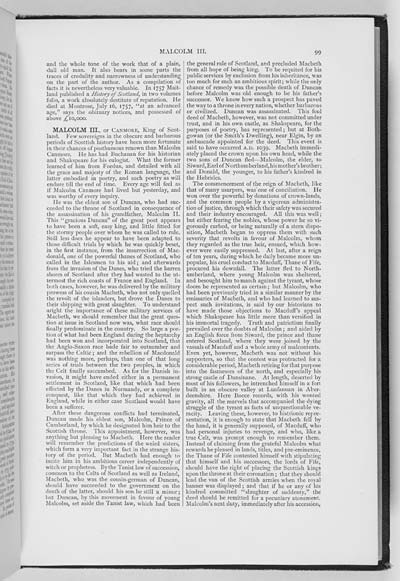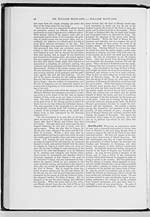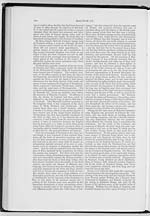99
and the whole tone of the work that of a plain,
dull old man. It also bears in some parts the
traces of credulity and narrowness of understanding
on the part of the author. As a compilation of
facts it is nevertheless very valuable. In 1757 Mait-
land published a History of Scotland, in two volumes
folio, a work absolutely destitute of reputation. He
died at Montrose, July 16, 1757, "at an advanced
age," says the obituary notices, and possessed of
above ;�10,000.
MALCOLM ILL, or CANMORE, King of Scot-
land. Few sovereigns in the obscure and barbarous
periods of Scottish history have been more fortunate
in their chances of posthumous renown than Malcolm
Canmore. He has had Buchanan for his historian
and Shakspeare for his eulogist. What the former
learned of him from Fordun, and detailed with all
the grace and majesty of the Roman language, the
latter embodied in poetry, and such poetry as will
endure till the end of time. Every age will feel as
if Malcolm Canmore had lived but yesterday, and
was worthy of every inquiry.
He was the eldest son of Duncan, who had suc-
ceeded to the throne of Scotland in consequence of
the assassination of his grandfather, Malcolm II.
This "gracious Duncan" of the great poet appears
to have been a soft, easy king, and little fitted for
the stormy people over whom he was called to rule.
Still less does he appear to have been adapted to
those difficult trials by which he was quickly beset,
in the first instance, from the insurrection of Mac-
donald, one of the powerful thanes of Scotland, who
called in the Islesmen to his aid; and afterwards
from the invasion of the Danes, who tried the barren
shores of Scotland after they had wasted to the ut-
termost the rich coasts of France and England. In
both cases, however, he was delivered by the military
prowess of his cousin Macbeth, who not only quelled
the revolt of the islanders, but drove the Danes to
their shipping with great slaughter. To understand
aright the importance of these military services of
Macbeth, we should remember that the great ques-
tion at issue in Scotland now was, what race should
finally predominate in the country. So large a por-
tion of what had been England during the heptarchy
had been won and incorporated into Scotland, that
the Anglo-Saxon race bade fair to outnumber and
surpass the Celtic; and the rebellion of Macdonald
was nothing more, perhaps, than one of that long
series of trials between the two peoples, in which
the Celt finally succumbed. As for the Danish in-
vasion, it might have ended either in a permanent
settlement in Scotland, like that which had been
effected by the Danes in Normandy, or a complete
conquest, like that which they had achieved in
England, while in either case Scotland would have
been a sufferer.
After these dangerous conflicts had terminated,
Duncan made his eldest son, Malcolm, Prince of
Cumberland, by which he designated him heir to the
Scottish throne. This appointment, however, was
anything but pleasing to Macbeth. Here the reader
will remember the predictions of the weird sisters,
which form a very important fact in the strange his-
tory of the period. But Macbeth had enough to
incite him in his ambitious career independently of
witch or prophetess. By the Tanist law of succession,
common to the Celts of Scotland as well as Ireland,
Macbeth, who was the cousin-german of Duncan,
should have succeeded to the government on the
death of the latter, should his son be still a minor;
but Duncan, by this movement in favour of young
Malcolm, set aside the Tanist law, which had been
the general rule of Scotland, and precluded Macbeth
from all hope of being king. To be requited for his
public services by exclusion from his inheritance, was
too much for such an ambitious spirit; while the only
chance of remedy was the possible death of Duncan
before Malcolm was old enough to be his father's
successor. We know how such a prospect has paved
the way to a throne in every nation, whether barbarous
or civilized. Duncan was assassinated. This foul
deed of Macbeth, however, was not committed under
trust, and in his own castle, as Shakspeare, for the
purposes of poetry, has represented; but at Both-
gowan (or the Smith's Dwelling), near Elgin, by an
ambuscade appointed for the deed. This event is
said to have occurred A.D. 1039. Macbeth immedi-
ately placed the crown upon his own head, while the
two sons of Duncan fled�Malcolm, the elder, to
Siward, Earl of Northumberland, his mother's brother;
and Donald, the younger, to his father's kindred in
the Hebrides.
The commencement of the reign of Macbeth, like
that of many usurpers, was one of conciliation. He
won over the powerful by donations of crown-lands,
and the common people by a vigorous administra-
tion of justice, through which their safety was secured
and their industry encouraged. All this was well;
but either fearing the nobles, whose power he so vi-
gorously curbed, or being naturally of a stern dispo-
sition, Macbeth began to oppress them with such
severity that revolts in favour of Malcolm, whom
they regarded as the true heir, ensued, which how-
ever were easily suppressed. At last, after a reign
of ten years, during which he daily became more un-
popular, his cruel conduct to Macduff, Thane of Fife,
procured his downfall. The latter fled to North-
umberland, where young Malcolm was sheltered,
and besought him to march against the tyrant, whose
doom he represented as certain; but Malcolm, who
had been previously tried in a similar manner by the
emissaries of Macbeth, and who had learned to sus-
pect such invitations, is said by our historians to
have made those objections to Macduff's appeal
which Shakspeare has little more than versified in
his immortal tragedy. Truth and patriotism finally
prevailed over the doubts of Malcolm; and aided by
an English force from Siward, the prince and thane
entered Scotland, where they were joined by the
vassals of Macduff and a whole army of malcontents.
Even yet, however, Macbeth was not without his
supporters, so that the contest was protracted for a
considerable period, Macbeth retiring for that purpose
into the fastnesses of the north, and especially his
strong castle of Dunsinane. At length, deserted by
most of his followers, he intrenched himself in a fort
built in an obscure valley at Lunfannan in Aber-
deenshire. Here Boece records, with his wonted
gravity, all the marvels that accompanied the dying
struggle of the tyrant as facts of unquestionable ve-
racity. Leaving these, however, to histrionic repre-
sentation, it is enough to state that Macbeth fell by
the hand, it is generally supposed, of Macduff, who
had personal injuries to revenge, and who, like a
true Celt, was prompt enough to remember them.
Instead of claiming from the grateful Malcolm what
rewards he pleased in lands, titles, and pre-eminence,
the Thane of Fife contented himself with stipulating
that himself and his successors, the lords of Fife,
should have the right of placing the Scottish kings
upon the throne at their coronation; that they should
lead the van of the Scottish armies when the royal
banner was displayed; and that if he or any of his
kindred committed "slaughter of suddenly," the
deed should be remitted for a pecuniary atonement.
Malcolm's next duty, immediately after his accession,

![]() Universal Viewer |
Universal Viewer | ![]() Mirador |
Large image | Transcription
Mirador |
Large image | Transcription
![]()

